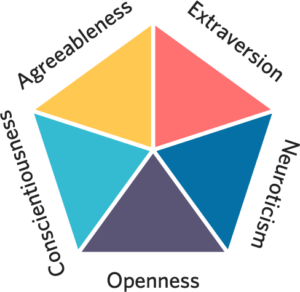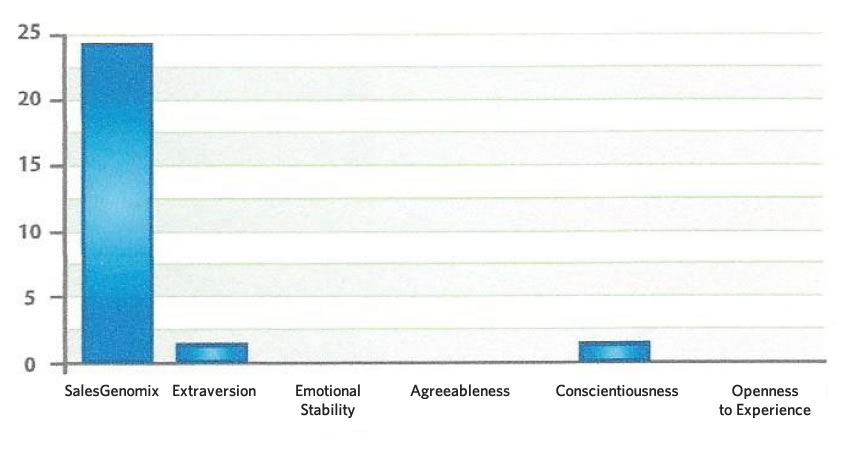1. Reliably predicts sales candidate success prior to hiring decision.
- Personality Tests: No
- The SalesGenomix Assessment: Yes
University research and employer-sponsored validation studies have statistically proven that SalesGenomix-recommended candidates are more likely to succeed on the job. In fact, the SalesGenomix assessment has proven 80% accurate in predicting candidate success.
In contrast, study after study has found little correlation between sales personality tests and job performance.
2. Recognizes that different sales jobs require a very different talent set.
- Personality Tests: Sometimes
- The SalesGenomix Assessment: Yes
In examining more than 500,000 sales professionals, we discovered that what can make someone successful in one sales role can actually cause them to fail in another. So SalesGenomix measures 140 sales attributes and distinguishes among 14 discrete sales roles.
In contrast, sales personality tests continue to promote a one-size-fits-all “sales personality” – or label a few roles with personality stereotypes.
3. Based on sound empirical research.
- Personality Tests: Rarely
- The SalesGenomix Assessment: Yes
All salespeople share some common traits. So we focus our research on what the top 10% of all sales performers do that the bottom 10% don’t. Then we apply the same actuarial sciences approach that insurance firms use to predict accident likelihoods and life spans to predict sales success on the job.
In contrast, most sales personality tests begin with a school of personality theory (Jung, Keirsey, Eysenck, etc) and then attempt to force fit it to the field of sales.
4. Reflects the unique demands of your sales environment.
- Personality Tests: Unlikely
- The SalesGenomix Assessment: Yes
Posted sales job titles alone don’t always reflect customer expectations and marketplace realities. So we take the trouble to understand what your salespeople are really up against in determining your ideal success profile.
In contrast, personality-test-based approaches rarely look beyond generic job roles.
5. Non-manipulatable.
- Personality Tests: Sometimes
- The SalesGenomix Assessment: Yes
Candidates can’t game our SalesGenomix questionnaire. Seemingly purposeless questions thwart choosing obvious answers. Built-in intelligence corrects for candidate spin attempts and response inconsistencies.
In contrast, the “correct” responses to some personality tests are actually posted on the Internet.
6. Industry-accepted.
- Personality Tests: Rarely
- The SalesGenomix Assessment: Yes
With a 20-year track record, the SalesGenomix assessment has already been adopted by more than 2,000 industry leaders, and is widely viewed as the industry standard.
7. Thought-leader endorsed.
- Personality Tests: Rarely
- The SalesGenomix Assessment: Yes
The SalesGenomix assessment has been positively reviewed by many sales force best practice authorities including the Aberdeen Group, CSO Insights, and The Association for Talent Acquisition Solutions.
8. EEO-compliant.
- Personality Tests: Possibly
- The SalesGenomix Assessment: Yes
SalesGenomix has been extensively tested among sales candidates of diverse backgrounds and conclusively found to be non-discriminatory.

How to detect a sales personality test
(even one in disguise).
While personality tests have been largely discredited in predicting sales candidate performance it’s not always that easy to recognize them.
One giveaway is the presence of the so-called “Big Five” personality traits.
If an instrument features the behavior labels Agreeableness, Extraversion, Openness to Experience, Conscientiousness or Neuroticism then you are almost certainly looking at a personality test.
However, be forewarned that some test providers have applied their own labels to the “Big Five” including Emotional Stability, Sociability, Introversion, Openness, Intellectance, Cautiousness, Dependability, Responsibility, Ego Drive, Resilience, Empathy, etc.
These variations are found in many assessments that claim to measure predictors of job performance but are instead simply measuring personality traits.
SalesGenomix predicts job success well beyond “Big Five” personality measures.
(Percent of variance in job performance accounted for)
Personality Tests Disguised As Acronyms
It’s also difficult to recognize personality tests because many have become better known by their acronyms. Examples include:
Acronym |
Test |
Provider |
| 16pf | 16 Personality Factor | IPAT |
| 6 FPQ | 6 Factor Personality Questionnaire | Sigma Assessment Systems |
| CPI | California Personality Inventory | Westburn Publishers |
| CPQ | Craft Personality Questionnaire | CraftSystems/Previsor |
| DPS | Dynamic Personality Shift | Kenexa |
| HWPI | Harcourt Workplace Personality Inventory | Harcourt |
| HPI | Hogan Personality Inventory | Hogan Assessment Systems |
| IPIP | International Personality Item Pool | Oregon Research Institute |
| JPRF | Jackson Personality Research form | Sigma Assessment Systems |
| NPQ | Manchester Personality Questionnaire | Hogrefe Ltd. |
| MMPI | Minnesota Multiphasic Personality Inventory | Pearson Assessments |
| NEO-PI-R | NEO Personality Inventory – Revised | Psychological Assessment Resources |
| OPI | Occupational Personality Inventory | Kenexa |
| OPQ | Occupational Personality Questionnaire | SHL |
| PIP | Personality Interview Profiler | PIP |
| RPQ | Rapid Personality Questionnaire | Kenexa |
| WPI Select | Work Personality Index Select | Psychometrics Publishing |
Personality Tests By Other Names
Then there are the personality tests that don’t have “personality” anywhere in their name but are readily identified as personality tests from their sales materials and user documentation.
- Caliper Profile
- CDR Character Assessment
- Conditional Reasoning Test of Aggression
- Devine Inventory/Select Best
- DiSC
- Employee Screening Questionnaire
- Gordon Personal Profile Inventory
- MBTI (Myers-Briggs Type Indicator)
- Personal Style Inventory
- Profiles Performance Indicator (Profiles Sales Indicator, etc.)
- Profilers Premium Placements Inc.
Industry sages agree: personality tests can’t predict candidate performance.
In evaluating the use of any sales personality test (disguised or not) it’s important to remember that Jung, Eysenck and Keirsey, the godfathers of today’s personality test providers, developed their theories working among psychiatric hospital inmates and disturbed adolescents. Their mission was to come up with a simple model to describe personality traits and disorders, not predict workplace performance.
In 1965, Robert Guion and Richard Gottier summed up 12 years of research published in the Journal of Applied Psychology and Personnel Psychology on the use of personality tests in making selection decisions. They concluded: “It is difficult in the face of this summary to advocate, with a clear conscience, the use of personality measures in most situations as a basis for making employment decisions about people.”
Years later, when 5 former editors from the Journal of Applied Psychology and Personnel Psychology convened to discuss the use of personality tests in hiring, they once again concluded upon a review of more than 7,000 scholarly studies that personality tests have a low validity for predicting job performance and there are major problems associated with using personality tests to make high-stakes employment decisions. (The full report and a follow-on report may be found here.)
Sales personality tests can’t compare to SalesGenomix.
Meanwhile, the SalesGenomix assessment draws upon 20 years of field research among 500,000 sales professionals. Findings incorporate 140 validated sales attributes, distinguish among 14 sales roles including sales management, are consistent across industry and address all EEO requirements.
The SalesGenomix report delivers unambiguous hire/don’t hire recommendations and is free of the psychobabble found in many so-called sales personality test findings.
Remember when you choose SalesGenomix, you benefit from an actuarial-sciences-powered, instrument that was designed from the get-go to predict candidate success in role-specific sales jobs.

